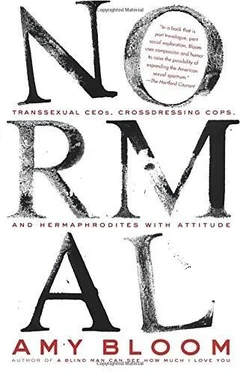It’s time for the vote. It seems that almost everyone in the small Mr. Fall Harvest division (featured “for the first time ever” at Fall Harvest 2000, “for our female to male guys”) wins for something, but the Miss Fall Harvest contestants occasion much shuffling and adding of points. The final three are selected, and Stella is not among them. There is some rumbling, Jim Bridges stalks over from the judges’ table, and after a little back-and-forth Mary Akers announces that there was a mixup and everything has been straightened out. Stella, in her low-cut evening gown, is back in the top three. There is generous applause for the gospel singer, for the old magician, even for Jeanette, and there is loud, fair-minded clapping for Stella, who reacts as if she’s won an Emmy after years of merely being nominated. Afterward a number of the men mutter that Stella won for showing that she had the equipment, not for doing anything talented with it.
Finally, music begins, and for a moment the judges and the crossdressers and their wives are standing on the dance floor snapping photos, hugging and kissing, sipping their drinks. Within five minutes, all of the crossdressers are off the floor and back to their tables or pouring out into the lobby for a little air. It’s too hot and hard to dance in corsets, padding, three-inch heels, heavy wigs, and beaded evening gowns. Even more than that, dancing would melt the makeup and ruin the illusion. Who would they dance with? In the moment of fantasy, even men who don’t desire a man as a sexual partner need a handsome man as a prop, as the necessary and missing accessory; a wife is not at all the perfect complement to a ball gown. Not to mention that most of the men — Presbyterian accountants from Cedar Rapids and Lutheran engineers from Omaha — can’t dance and never do, not in suits, and not in dresses. I am out on the dance floor doing the macarena with twelve tired, cheerful wives, all of whom have kicked off their shoes and are getting down, hands on rumps, laughing and drinking, until it is so late that we close the joint.
After the cruise, after follow-up e-mails with Melanie and Peggy and more phone calls with the Fairfaxes, I found that I had more to say than I had thought, and more concerns about saying it. I didn’t want to demonize or pathologize any sexual preference or behavior that doesn’t hurt anyone. I didn’t want to make fun of fetishists. Now that our culture has begun to shift toward the notion that reciprocal, mature love between two people, of the same or opposite sex, is not a disease, I didn’t want to consign everyone who isn’t just gay or straight to the DSM junkpile. I wanted to focus on people like Steve and Sue, happily married for thirty years and not caring that with waning hormones they are now often mistaken for a lesbian couple, or on Tory and Cory with their buoyant puppy love, swapping party dresses and playful kisses. I wanted to see crossdressers as so many of them saw themselves. And I did, as with Dixie and Rebecca, but I also saw many of them very differently.
The men I met were, by and large, decent, kind, intelligent, and willing to talk openly; their wives were the same, many under the additional pressure of having to make the best accommodation they can to a marriage they did not envision and do not prefer. But it does seem to me that a passion for a person, or a capacity to love people, is different from a sexual impulse that is directed toward an object or an act and that is greater than the desire for any person. And although one could argue that all desire focused on an object or even an act is a fetish, I don’t think so — any more than I think that gender reassignment surgery (even when it’s known as gender confirmation surgery) is no different from a tummy tuck. The greatest difficulty people have with crossdressers, I think, is that crossdressers wear their fetish, and the gleam in their eyes, however muted by time or habit; the unmistakable presence of a lust being satisfied or a desire being fulfilled in that moment, in your presence, even by your presence, is unnerving. The mix of the crossdressers’ own arousal and anxiety and our responsive anxiety and discomfort is more than most of us can bear. We may not mind foot fetishists, but we may not wish to watch either.
The crossdressers of Tri-Ess insist that crossdressing is not about sexuality, and therefore not about sex. They are right about the first, and we can all stop assuming that any man who wears a dress is gay. But they are not right about the second, and their assertion that crossdressing is their creative expression of both genders is unsettling because it is at such odds with their behavior, their natures, and their marriages. These men are as far from gender warriors and feminists as George W. himself. As one wife said to me, “For twenty years he couldn’t help with the dishes because he was watching football. Now he can’t help because he’s doing his nails. Is that different?” For these men, the woman within is entirely the Maybelline version, not the Mother Teresa version, not the Liv Ullmann version, and not even the Tracey Ullman version. There is no innate grasp of female friendship, of the female insistence on relatedness, of the female tradition of support and accommodation for one’s partner and of giving precedence to the relationship overall. If you believe that these characteristics are more common to women than to men, these men do not embody them; if you don’t believe it, they would argue with you. If there were that kind of understanding, that kind of empathy and female bonding, rather than accessories and tapes on how to walk in heels, these guys would be unable to ask their wives to go through this crossdressing life with them, and everyone, husbands and wives, knows it. They know that if the women insisted on wearing three-piece suits or baseball uniforms in public, and asked their husbands to accept hairy legs, hairy underarms, and jock-straps as part of their sex life, the husbands would not be rushing off to join spousal support groups while cheerfully spending the family’s money on bespoke suits and expensive glue-on facial hair. The marriages would be over.
As with the Ladies’ Home Journal of the 1950s, or Cosmopolitan in the 1970s (and 1980s and 1990s), when I read Tri-Ess’s advice to wives, I don’t know whether to laugh or cry: It’s probably your fault but you can fix it, he really needs you but he may not show it, your love will overcome his problem, and a good man is hard to find. If Dickens’s devoted, selfless Nancy were alive today — and Bill Sykes, his sadism aside, is exactly the kind of macho, over-compensating, risk-taking guy one might find crossdressing — she would be in a wives’ support group, happy to pick out a lipstick, apologizing if they ran out of Slim-Fast just a week before Fall Harvest.
Is it just delicious irony that makes so many people’s eyes sparkle when I tell them about my Christian Republican crossdressers? Is it something less sophisticated, like schadenfreude, or even less civilized, like homophobia? It is gratifying to yank the covers off hypocrites: the fundamentalist Christian congressman with his handsome young pages, the feminist and her abusive boyfriend, the priest and his porn.
The widespread assumption is that these crossdressers are hypocrites: publicly lambasting deviance of all kinds and dressing up in private like Little Bo-peep. There is still plenty of Little Bo-peep (and Courtney Love and Scarlett O’Hara), but the lambasting has died down considerably over the last thirty years. In the past, crossdressers were eager to dissociate themselves from gay men and about as interested in feminism as Ward Cleaver. But now, as with the end of the Soviet Union, the unimaginable has happened and the landscape has changed. All the crossdressers I spoke to expressed their admiration for the gay civil rights movement and their hope that whatever acceptance gay people have managed to engender would somehow envelop crossdressers as well. Gay men and women turn out to be their role models in terms of self-respect and civil rights, even if the crossdressers are well aware that the gay community offers them tolerance, not a warm welcome. And feminism, of the women-are-nicer-people variety, although not a part of the wives’ lives, adds an unexpected aspect to the men’s self-understanding; in their remarks about the burdens of masculinity and the innate nurturing and graciousness of women, in their attempts to connect with Nature and Spirit, they sound like the softest and most Goddess-worshiping of Second Wave feminists.
Читать дальше












